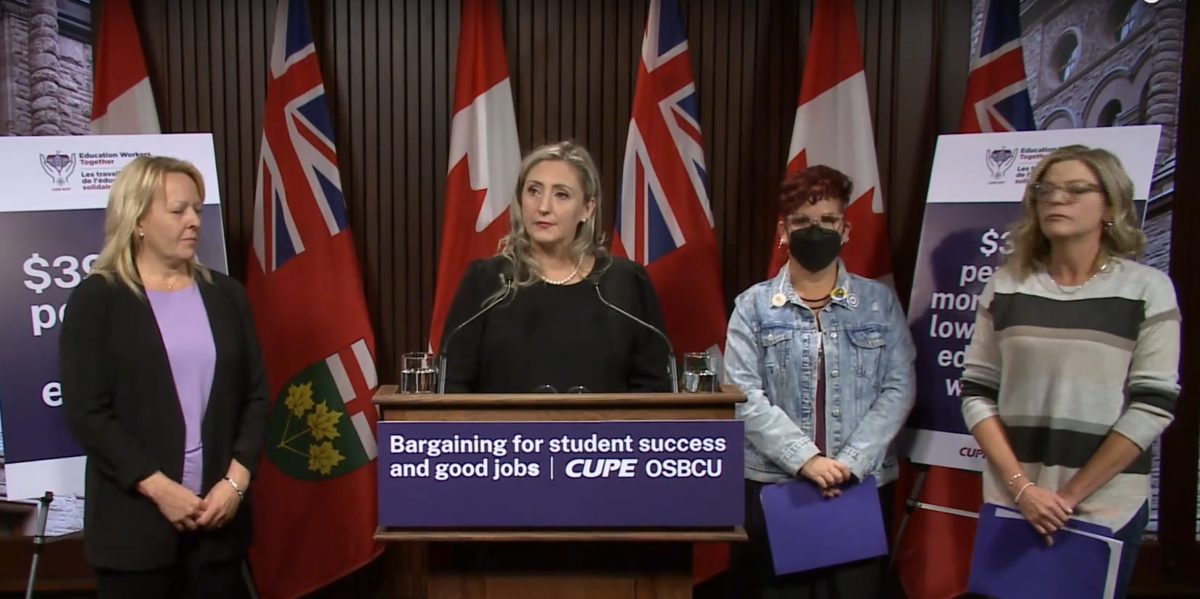Results of a recent ratification vote from members of the Canadian Union of Public Employees (CUPE) may have been surprising for people who had been following bargaining news. The results were announced on Monday, December 5, and the agreement passed by 73 per cent. Despite some disappointment with the newly ratified collective agreement, CUPE’s Ontario School Board Council of Unions (OSBCU) made a commitment to continue to fight for workers and students in Ontario’s public schools.
Laura Walton, president of CUPE’s Ontario School Board Council of Unions (OSBCU), had said in a press conference that she did not like the deal she was taking to members. When announcing the vote results, she said that, while she did vote in favour of the deal, she expected the agreement to pass by a smaller margin.
More than 75 per cent of OSBCU members participated in the online ratification vote. The engagement in this vote was four times higher than a similar vote in 2019, according to CUPE Ontario.
While it seems that the vote shows a strong percentage of membership in favour of this deal, disappointment online was palpable.
On Twitter, many of the responses to OSBCU’s post announcing the vote results expressed disappointment.
On Facebook, user Rose Allain, whose profile says she is a member of CUPE local 3396, said in a Facebook post that she will be wearing black on “Education Worker Wednesday” to express her disappointment with the deal.
“Yes, we accepted a contract but by doing so, we have lost so much,” Allain wrote in her post.
“I respect democracy but don’t have to be happy with the results, especially when I know that many members voted ‘yes’ to the offer out of fear rather than support,” the post continued.
Allain did not reply to rabble’s request for an interview.
Michelle Campbell, who addressed reporters on Monday with Walton and OSBCU vice-president Christine Couture, said she understood why some may not see this deal as sufficient.
“While I voted to accept this agreement, I totally understand how some of my coworkers didn’t,” Campbell said. “Working as an EA [educational assistant], I have never seen anything as bad as what schools are like right now. There simply isn’t enough staff to do the work to support our students.”
Walton said on Monday that the wage increase secured in the new deal is double what education workers would have received under the deal that the Ford government tried to impose using Bill 28.
READ MORE: Bill 28, an act so unconstitutional it comes with the notwithstanding clause
“‘It is my greatest hope that this deal begins to alleviate the need and shows workers after years of being overlooked and underappreciated that our work is valuable,” Walton said.
This deal is the first in a decade to be freely bargained without legislation that interferes with the process, according to a CUPE Ontario release. Walton said on Monday that in her career bargaining has always been influenced in some way, whether by Bill 124 or Bill 28.
While this is a step forward for free collective bargaining in the public sector, there is still more to be done. This agreement did not include commitments to improving services for students, as Walton said in a previous press conference.
Walton stressed that this deal is not the end of the fight for education workers and the public school system.
“Change is not only won at the bargaining table and in collective agreements,” Walton said on Monday. “We are going to keep mobilizing and I will keep fighting with you. We pried every improvement from this government that we could this time. Tomorrow we start to harness the momentum and start organizing for the next fight because we have far more fight left in us and more left to accomplish.”
Campbell reiterated this sentiment, saying she was personally prepared to hold the government accountable for everything they do in the coming years.
“To education workers, I hope the fortitude we all found stays with you,” Campbell said. “Hold our head up high, be proud of what we did and know that ratifying this agreement is not the end, not by a long shot. We are just getting started.”




